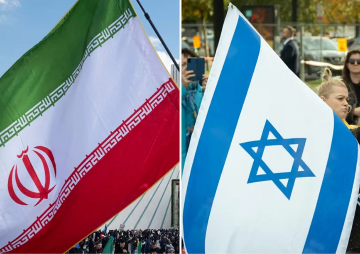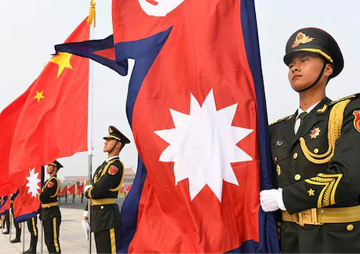"
Although India's entry into the field of cyber security has been relatively late and much of the internal institutional streamlining is yet to take effect, the level of cooperation between India and the US in the field of cyber security has been substantial - something unimaginable a decade ago.
Cooperation between India and the US on cyber security started following the then Indian Prime Minister Atal Bihari Vajpayee's visit to the US in 2001. The visit facilitated the establishment of the India-US Cyber Security Forum which
focused on "cyber-security, cyber-forensics and related research and" aimed to work "...towards enhancing co-operation among law enforcement agencies on both sides in dealing with cyber crime". Both governments planned to use the Forum as a platform for increased cooperation between Indian Computer Emergency Response Team (CERT-IN) and the US National Cyber Security Division, defence services, industry as well as technology and between the standardisation agencies from both sides. The forum, which grew out of the larger counterterrorism dialogue between India and the US, hit a stumbling block when a spying scandal involving Indian and American officials participating in the forum came to light in 2006.
After a lull, the cooperation between the two countries on cyber gained momentum when the Indo-US strategic dialogue was initiated in 2010. Stemming from the foundation laid by the bilateral strategic dialogue, New Delhi and Washington signed a
memorandum of understanding (MoU) to promote increased cooperation and exchange of information on cybersecurity in 2011. The MoU facilitates sharing of cybersecurity-related intelligence and cooperation on a whole range of other operational and technical issues between the CERTs of the two countries.
The topic of cyber security gained prominence in the subsequent bilateral strategic dialogues held between New Delhi and Washington. During the fourth round of
India-US Strategic Dialogue held in June 2013, "Minister Khurshid and Secretary Kerry emphasized the need for the United States and India to develop stronger partnerships on cyber-security, including through the next iterations of the Cyber Security Consultations, the Strategic Cyber Policy Dialogue, and the Information and Communications Technology Working Group". The two countries also
agreed to "hold another round of whole-of-government Cybersecurity Consultations chaired by their respective national security councils to coordinate positions on cross-cutting cyber-security issues that impact international and economic security". These consultations will include topics such as "cyber security best practices, supply-chain security, and norms of responsible state behavior in cyberspace".
A Strategic Cyber Policy Dialogue was also initiated in 2013, which was chaired by the Indian Ministry of External Affairs and the US State Department. "Norms of responsible state behavior in cyberspace, internet freedom, internet governance, and cybercrime cooperation" were discussed during the dialogue.
Besides these high-level interactions, Indian and American officials have also been
participating in several bilateral and international exercises and programmes aimed towards capacity building and enhancing mutual understanding, such as the US Cyber Storm national cyber incident response exercise. Additionally, India has also been an active participant within the UN Group of Governmental Experts (GGE) on Information Security, where it has worked with the US and other members to shape norms of behaviour in cyberspace.
While the Snowden revelations had an impact on America's bilateral relations with many countries, it had a limited affect on Indo-US relations including on cyber security. Even as the two nations have tried not to let the occasional hurdles derail the larger process of deeper cooperation on cyber security, concerns still remain on both sides. For instance, an area where Indian security agencies require assistance from the US is creating a working mechanism to combat the use of the internet and social media by anti-social, criminal and terrorist networks. India appears to be
unsatisfied with the current state of affairs and is demanding the US owned service providers to be more responsive towards requests sent by Indian security agencies. This was
highlighted during the recent US-India Police Chiefs conference held in New Delhi in December. On the other hand, the American side still finds it difficult to demystify the Indian cyber bureaucracy since for a long time it remained uncoordinated and opaque.
With the launch of the National Cyber Security Policy (NCSP) by India, many of these hurdles are expected to be removed. While the streamlining of Indian cyber bureaucracy has started with implementation of the NCSP, the process of implementation itself has been slow. However, the steps initiated by India are expected to open avenues for deeper cooperation. The NCSP
emphasises "develop
bilateral and multi-lateral relationships in the area of cyber security" and enhancing "...global cooperation among security agencies, CERTs, Defence agencies and forces, Law Enforcement Agencies and the judicial systems".
Today, India is aiming to provide internet connectivity to the remotest corners of the country, hoping to use the digital sphere to deliver essential services to its citizens. The challenge would be to make these networks secure and resilient as any disruption could have the potential to affect the lives of millions. This would require large-scale support from the global players such as the US who could provide the necessary equipment and share best practices. Although there has been positive movement towards deeper cooperation between the two countries in matters related to cyberspace, there is substantial room for improvement to take the cooperation to a truly strategic level. Despite occasional hurdles, the congruence of notions of democracy, freedom of expression as well as market dynamics will make India and the US natural partners in cyberspace and ensuring its security. These shared interests and concerns should be the principles guiding the process forward.
(Rahul Prakash is a Junior Fellow at Observer Research Foundation, Delhi)
Courtesy: ORF Cyber Monitor
"
The views expressed above belong to the author(s). ORF research and analyses now available on Telegram! Click here to access our curated content — blogs, longforms and interviews.




 PREV
PREV

